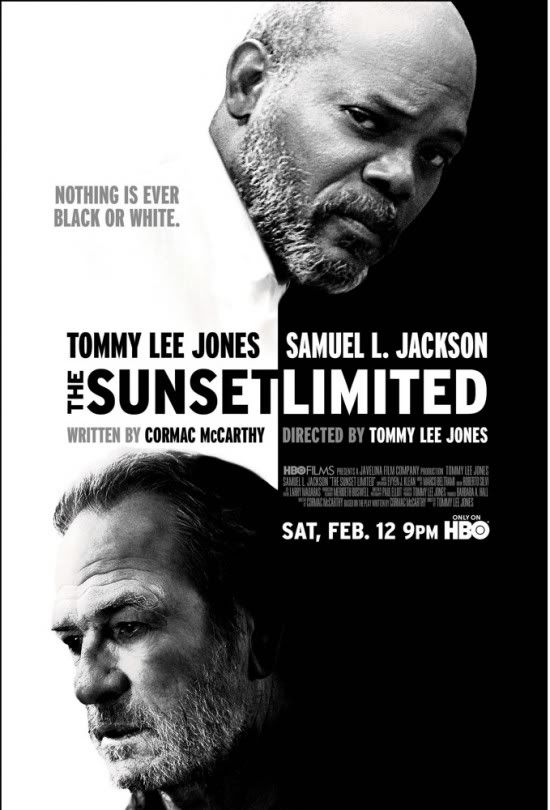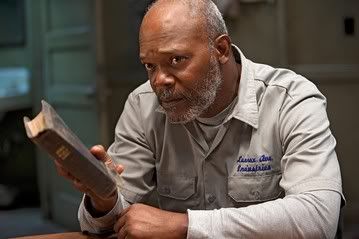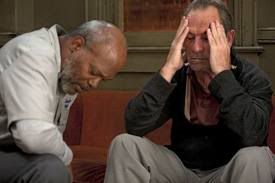
The Sunset Limited (Jones, 2011)
Cormac McCarthy is, in all likelihood, the English language's best writer. At the very least he competes for the title. Lately cinema has latched on to McCarthy's works: the Coen's adapted No Country for Old Men, John Hillcoat brought The Road to life, James Franco is lobbying to helm a screen version of Blood Meridian; however, Tommy Lee Jones may, with The Sunset Limited, be the first to dip in to McCarthy's rather lean dramatic output in an attempt to bring the revered writer's works 'alive.' If movies have proven one thing time and time again it is that simply drawing inspiration from a rich source does not always yield a fruitful harvest, so in adapting one of McCarthy's denser, and much less critically hailed texts, Jones arguably has a much greater challenge than any of the aforementioned directors. The 'action' of The Road does not exist, the comedy of the Coens is not here, and whatever Franco has in mind for a book deemed unfilmable may or may not be present. And even without those qualities, Tommy Lee Jones delivers an adaptation that deserves to be mentioned alongside the best adaptation of the great novelist's works.
Clocking in at a meager 90 minutes, The Sunset Limited plays out as one long scene involving a conversation between the two main characters, Black and White. White, a professor, is saved by Black when he attempts to jump in front of the Sunset Limited train. Black brings him back to his nearly barren apartment in the ghettos of New York City to make sure that White does not attempt to kill himself again, supposedly. The situation is seemingly mundane, so Tommy Lee Jones and Samuel L. Jackson need to bring life to White and Black, respectively, in order to sustain a lofty premise. Both of the actors are firing on all cylinders, but the two are aided even further by the wonderful script. I am not incredibly well versed in McCarthy's works, only having read two or three, but The Sunset Limited stands out as McCarthy at his most philosophic. What appears to be a simple conversation in an apartment becomes a cataclysmic encounter of ideologies, theological and philosophical perspectives being placed together in a room and simply existing. I was not surprised to hear that McCarthy was on set quite often during filming, helping the actors and making sure his script remained almost completely unchanged from the original play.

Jones's The Sunset Limited is, much like the source material, an examination of binaries in relation to the world in which we live. What I find compelling is the dramatic construction of the film, we start out dividing these characters down to their most basic traits. Then the film goes deeper, bypassing race and starting to examine the economic gaps between the two men. White attempts to thank Black by offering him $1000, but he says that sum is minor and ups it to $3000. And it only continues to build until the movie is no longer about two men in an apartment, it becomes two forces in the universe. The film makes it rather apparent that neither of the entities are going to be forced from their position, in fact the struggles they are locked in are so entrenched in the human condition that anything other than the one testing the other seems impossible. What becomes fascinating is not just the way the two men square off, surprisingly on equal ground all things considered, but how they interact, come close to mingling, to co-existing, the hope that they, or rather we, can find reach an understanding, if not a balance. The Sunset Limited is not an exercise in ideology, it is a decathlon in existence.
Essentially, The Sunset Limited is far more dense than a simple review can cover. If I offer interpretations of the themes I would be more or less be exposing my outlooks on life. If the film has a prevalent theme it can be found in the unsolvable of the world and the resolve of humans to continue, one way or another, along the life in which we are trapped. Or given. Perhaps we are too entrenched in society to ever completely let go, or perhaps we simply tethered to a past that guides our future. This film, oddly, is most similar to the work of Sasha Baron Cohen, existing in an odd space that is capable, perhaps more than many other films, what we really know about ourselves. Borat asks the viewer to watch others and judge, but it also asks us to acknowledge how we perceive the world, by presenting constantly opposing forces, but examining them, The Sunset Limited asks us to do the same. It may be scary, it may be frightening, uplifting, depressing, too intense to handle, but with The Sunset Limited we can learn, we can discovery, we can be.

If any complaints can be levied against the movie it would have to be in the technical manner the film is constructed. Tommy Lee Jones simply does not have a camera that can keep up with the rapid exchanges between Black and White, but it also never actively gets in the way either, so it is more pedestrian than anything. At the very least it does not get in the way of the wonderful script, which is more than can be said of the score. While the score itself is beautiful, blending traditional music with the sounds of trains in the distance, it's sparring use is meant to draw attention to the more important monologues in the film; instead, by coming in so heavily and not really existing in any other context the score is simply distracting. This aspect simply seems odd, especially when all of the natural sound does enhance the script by serving as background noise that adds a sense of dread to White's more fervent speeches. Two missteps, one incredibly minor, but large enough to hold the film back from elevating it from a great adaptation to a great film.

And when it comes down to it The Sunset Limited is an outstanding adaptation anchored by a stunning script and two top notch actors giving top notch performances. The best parts of the play are captured in the film without losing any of the aspects that still makes it feel theatrical. This movie is challenging because I love McCarthy's play so much, because the ideas at the heart of the script are so appealing, I almost feel as if saying I love the film is a cop-out. So I will not profess my love for the film, because technically the aspects of the movie that film allows are its weakest parts. What I will say is that Tommy Lee Jones captures the spirit of one of the language's greatest writers and arguably makes a damn fine film in the process.
Comments are encouraged and, for anyone with a literary mind, I encourage checking out my poetry blog filled with all original works for your reading pleasure.
Also I am on the old Twitter thing so I guess you can follow me at twitter.com/FLYmeatwad.
No comments:
Post a Comment